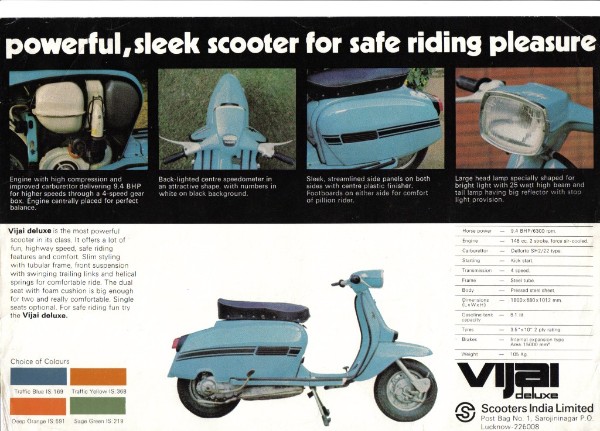INDIAN FRAME NUMBER INFORMATION
 |
1970's Sales Leaflet for the Vijai Deluxe |
AUTO PRODUCTS INDIA
Lambretta production started in India in the 1950's with Auto Products India (API) who had a licensing agreement with Innocenti. API's production began with Model D and LD scooters. Initially scooters were built from parts shipped in from Italy and assembled in India. However, as time went on the Indians moved into building the Series 1 Li 150 (4 pole) and then the Series 2 Li 150 (6 pole) and they began to manufacture their own parts and machines.
In 1973 after losing the right to use the Lambretta name, all Series 2 Li 150's built by API became Lamby 150's. Production of the Series 2 machine carried on until approximately 1992 when the last batches of machines were dispatched from the API factory. The Lamby 150 retained the 6 pole set up.
Interestingly, in the 1970's API produced their version of the Series 2 TV 175 and this was called the MAC 175S. These machines are very similar in looks, though the MAC has rounded side panels with no indents and no panel hanles. It also came equipped with a 120kph speedo.
Interesting Points to note:
All API machines came with single seats fitted.
The Series 2 Li 150's had speedos made under licence by Yenkay, Pricol and Rainbow. They display the API logo and are 100kph items.
Lamby Polo - produced as a design collaboration between API and the Japanese, the Polo was advertised as the Space Shuttle on two wheels. It had redesigned legshields, headset, sidepanels, horncast and other items and its engine came with 12 volt electrics.
Along with the Lamby 150, the last Lamby Polos were built and despatched in 1992
SCOOTERS INDIA LIMITED
Set up by the Indian Government in 1972, SIL undertook production of the GP range of machines during the 1970's, 80's and 90's. In the main thse machines are predominantly 150cc, with some 200's and very few 125 machines. In 1982 SIL produced their version of the 100cc CENTO though not many were built and production of them ceased in the same year.
The GP 150 had numerous names in India including; Vijai Super, Vijai Vulcan, Vijai Deluxe, Vijai Super (Mk 2), Vijai Super Grand Prix 150 and the Allwyn Pushpak. There are some differences between the Mk1 and Mk 2 machines.
Mark 1:
Fixed front mudguard and 6 volt electrical system.
Mark 2:
Turning front mudguard, indicators fitted (initially on stalks that were mounted under the headset, this changed on later models to indicators mounted on the legshields. They were also mounted on the sidepanels). The Mark 2 had a 12 volt set up.
GP 200
Not really built for the Indian market as these were destined for export to Europe and the United States. Though some did end up in India. Essentially the scooter was the same as its Italian counterpart.
GP 125
Very few of these machines were built. They were often simply modified GP 150's or were built partially from parts from the Innocenti factory.
SIL GP 125, 150 & 200's: When these machines were first produced the frame stampings remained almost as they had when the Italians built them. HOWEVER, whereas the Italian machines will have a DGM number after the frame number the Indian machines will not.
GP 125: Early SIL made GP 125's are stamped 22/1* and have frame numbers that started at 009. It is also important to note that later built GP 125's had the frame numbers preceded by a 2 digit number that denotes the country it was built for (this practice was also used on the GP 150 & 200 models).
GP 150: Early GP 150's were stamped 22/0* which was followed by the frame number. Later machines had the frame prefix, then a star then a 2 digit County identifier another star and then the frame number.
GP 200: Currently we have no information on what numbering sequence the GP 200's started at but they were stamped 22/2.
Country Identifiers
Later produced SIL frames were stamped (for example)as follows:
22/0*00*000000
The 2 digit number after the frame number denotes the country that the scooter was built for. The countries being as follows:
00 - not used
01 - USA
02 - UK
03 - Columbia
04 - Singapore
05 - Italy
06 - Hong Kong
07 - West Germany
08 - Algeria
09 - Thailand
10 - Iran
11 - Japan
12 - Pakistan
13 - Greece
14 - Malaysia
15 - Indonesia
16 - Mauritius
17 - Switzerland
18 - Sri Lanka
19 - Nepal
20 - New Zealand
21 - Egypt
22 - Lucknow
23 - Bihar
24 - West Bengal
25 - Kerala
26 - Syria
27 - Australia
28 - South Yemen
29 - Bangladesh
30 - Tawi Scooters Ltd
31 - Spain
32 - Sweden
33 - Belgium